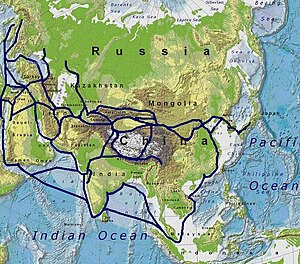Market access
Prior to a country's accession to the WTO, it must negotiate with existing Members on tariff bindings, which will be listed later in its Schedule of Concessions.
According to Article XI:1 of the GATT, unless there is an exception, WTO Members are not allowed to ban the importation or exportation of goods or to subject them to quotas.
Transparency and justiciability The requirement that Members shall publish all trade laws, regulations and judicial decisions in order to allow governments and traders to have access to and become acquainted with them is crucial to ensure effective entry to foreign markets.
[9] Preferential market access refers to the fact market opening commitments that go beyond the WTO obligations, either because the exporting country of origin has an agreement to establish a free-trade area (FTA) with the importing country, or because the latter has accorded them special treatment by virtue of the former’s low level of development and/or due to its adoption of certain policies to embrace sustainable development.
The formation of free-trade areas is considered an exception to the most favored nation (MFN) principle in the WTO because the preferences that parties to an FTA exclusively grant each other go beyond their accession commitments.
According to Article XXIV:8(b) of the GATT, “a free-trade area shall be understood to mean a group of two or more customs territories in which the duties and other restrictive regulations of commerce (except, where necessary, those permitted under Articles XI, XII, XIII, XIV, XV and XX) are eliminated on substantially all the trade between the constituent territories in products originating in such territories.” The Decision on Differential and More Favorable Treatment, Reciprocity and Fuller Participation of Developing Countries adopted by signatories to the GATT in 1979 (the “Enabling Clause”) allows derogation to the MFN treatment in favor of developing and least developed countries (LDCs).
Evidence from recent research proves that in all market access areas, FTAs in general offer "value added" as compared to the GATS.
However, most RTAs do not surpass the GATS as it comes to securing the "rule-making interface" between domestic regulation and trade in services, as well as to special and differential treatment for LDCs.
RTA commitments are also inclined to lag behind GATS offers (known as GATS-minus) with regard to safeguard mechanism and disciplines on subsidies.
At the same time, it will require the identification of restrictions in foreign markets and skillful negotiations towards reducing and removing them so as to maximize their export revenues.
Health technology assessment (HTA) organizations like the Institute for Clinical and Economic Review (ICER) contribute to the evidence base.
Market access may be restricted through a variety of means including the coverage (e.g., formulary), insurance coding, reimbursement, value-based contracting (VBC), and outcomes-based compensation (OBC) policies of third-party administrators (TPAs), third-party payers (TPP), capitated healthcare providers (e.g., Kaiser), and self-funded employers (e.g., Boeing).
For example, parents, nutrition companies, and patient advocacy groups may engage lobbying firms to ensure legislators mandate insurance coverage for less obvious healthcare products such as medical foods for phenylketonuria (PKU).
Many health industry stakeholders now apply advanced data science methods to (1) define and measure value and (2) expand or restrict market access based on value.
The U.S. government apparently sees value in accelerating development of real-world scientific evidence for medical products within the existing U.S. regulatory framework.
The application also covers tariff rate quotas, trade remedies, rules of origin as well as corresponding documentation, bound tariffs of WTO members, non-tariff measures (NTMs) and trade flows to help users prioritize and analyse export markets as well as prepare for market access negotiations.
This database is gradually expanding with the ultimate goal to cover over 400 FTAs and preferential schemes that are currently active in the world.

